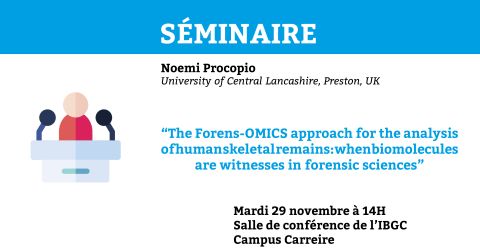“The Forens-OMICS approach for the analysis of human skeletal remains: when biomolecules are witnesses in forensic sciences”
Dr Noemi Procopio is the Principal Investigator of the "ForensOMICS" Team at the University of Central Lancashire in Preston, UK. Her PhD in Forensic Proteomics was supervised by Dr. Michael Buckley and she investigated the process of decay for forensic and archaeological applications. After her PhD, she joined Northumbria University as a Lecturer in Forensic Science and she is now Senior Research Fellow in Forensic Taphonomy at the University of Central Lancashire. In 2019 she was awarded with the prestigious UKRI Future Leaders Fellowship with the project titled "Forens-OMICS": a cross disciplinary implementation of omics sciences to in vivo and postmortem ageing investigations for forensic applications. The aim of her project is to investigate how biomolecules, and in particular proteins, metabolites and DNA, can survive and decay after death, to identify new biomarkers in human bones capable of revealing information on the chronological age and the post-mortem interval (PMI) of the individuals. She is also investigating on the use of metabarcoding analyses to study microbial populations for individual identification and PMI estimation purposes. Part of her research also involves the application of proteomic analyses to archaeological human remains to investigate on lifestyles and health conditions of past populations.
Conference asbtract : One of the greatest challenges in forensic science and criminal investigations is the estimation of the time elapsed since death of an individual (post-mortem interval, PMI) and of their age-atdeath (AAD). Existing methods used to estimate PMI and AAD mostly rely on the morphological examination of the cadaver, however these analyses are often inaccurate, and methods should be developed to estimate PM/AAD in more objective and reliable ways. The “Forens-OMICS” project is aimed at applying multiple omics analyses, such as DNA methylomics, proteomics and metabolomics to modern human skeletal samples obtained from several Human Taphonomy Facilities (HTFs) around the world, to look for new biomolecular markers correlated with PMI/AAD. This seminar will present the project, the challenges, the results obtained so far using the different -omics approaches and future directions of this research.


